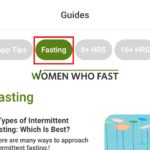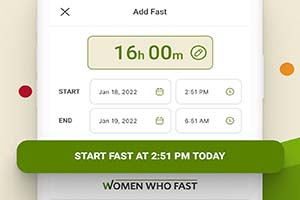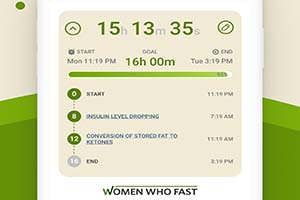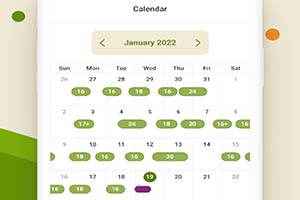Isn’t weight loss just a matter of burning more calories than you eat?
(Remember, I’m not a doctor so everything I say comes from what I’ve learned from a lot of research and my own personal intermittent fasting journey.) We’ve always been taught that weight loss equals calories in versus calories out. That’s why many of 
{RELATED POST: Intermittent Fasting For Women Over 50 }
Unfortunately, there’s a problem with those charts. The charts are based on a statistical average derived from millions of people over many decades. And none of them factor in the uniqueness of YOUR personal biology. Ironically, many times the calorie suggestions are too low and actually slow down weight loss. (Leaving some of us starving and dizzy.)
Discouraged with our lack of progress, we further decrease our caloric intake prompting our metabolism to think it might be entering a famine. Still determined, we may even increase our activity level in an attempt to burn more calories. All of the sudden, what seemed like the perfect solution to lose weight causes the body to start hoarding fat for the future in case it needs it to keep us alive. (Think bears and hibernation and all that.)
Make sure you are losing fat (not muscle) from the right places.
Get the arboleaf Smart Scale and Smart Measuring tape today!
Calorie restriction ONLY works if you make sure you aren’t eating too few calories as well as too many. With intermittent fasting you do all of your eating within a shorter period of time which typically results in less calories “in” overall. As time goes by, your body becomes accustomed to the timed eating and knows that it will be fed satisfactorily at certain times and not to worry about starving.
{RELATED POST: Reasons To Lose Weight: What Are Yours?}
Will fasting work for you?
Because you aren’t eating as often, you can eat until you are pleasantly full (not to be confused with STUFFED.) This pattern allows your 
That said, there are several sneaky medical conditions that can throw a wrench in the works and inhibit weight loss no matter what you are doing. The one I see mentioned the most among professionals and fasters is insulin resistance. Insulin resistance can lead to diabetes so if you have it, you want to know.
Here’s my personal understanding of insulin resistance: When insulin resistance occurs, excess sugar in the blood your cells don’t need for energy is rapidly converted into fat. (Yikes!) This happens to prevent the sugar in our blood from becoming dangerously high. At the same time, it makes losing weight very, very difficult. And even more importantly, it can signify a major health concern. (Here is an official explanation of insulin resistance certainly worth reading.)
I have insulin resistance on my list to discuss with my doctor at my next physical. In the meantime, I ordered an HbA1c home test from Amazon to check it myself now. I found out about Everywell home tests from the intermittent fasting Facebook groups I participate in. They also have tests for many of the other conditions that can stall weight loss, plus tests for allergies, vitamin deficiencies, std’s, etc.) I love the Everywell home tests because they are so easy, private and CONVENIENT. And plus, if something concerning comes back, I can see my doctor sooner than I’d planned.
Women Who Fast is a participant in the Amazon Services LLC Associate Program, which means we receive a commission if you purchase through our link, at no extra cost to you.
After purchasing my test, Everlywell sent me a promo code for a discount towards a second test. I purchased another HbA1c test to use in several months to monitor my changes.
The good news is, intermittent fasting is an excellent way to lower blood sugar for most of us. According to Health Hub360°, when we fast, our blood sugar levels naturally reduce. The body has a short-term supply of energy – a savings reserve, if you like – which it stores in the liver and muscles as glycogen. After between 12 and 24 hours without food, stores of glycogen become depleted.
Experts agree that intermittent fasting is not for everyone. Please read our Terms of Use.
What should I eat?
Intermittent fasting is not about food. Repeat. Intermittent Fasting is not about food. Dawn and I can talk for hours about Intermittent Fasting and weight loss without ever even mentioning food. The truth of the matter is, you can literally eat anything (unless you have a specific health restriction). But at the same time, you can also incorporate eating plans within your fasts and that is fine too.
I wish I could give you an exact food plan to follow to find your sweet spot to lose weight in a healthy way. But the reality is, no one can do that. If you are like me, you’ve tried lots of other diets that work at first but then eventually don’t work. That’s basically the definition of un-sustainable. 🙂 Many of the other fasting apps I’ve used offer food coaching plans (for a price) and then send a nicely worded “plan” that obviously comes straight from one of those charts! The truth of the matter is, YOUR sweet spot to sustainable weight loss is a mystery only you can discover.
Always remember, many of the successes that accompany fasting have nothing to do with weight loss. There are LOTS of people out there fasting without even wanting to lose weight. But if you want to lose weight, you will need to decide for yourself how you eat when you are not fasting.
Is your eating plan sustainable?
From my experience, strictly restricting carbs always leads to weight loss. Honestly, very quick weight loss. A couple of years ago, I went an entire year without eating any processed sugar. (that I knew of at least!) and very few carbs each day. I lost 60 pounds and I was confident I had this weight loss thing figured out. And then….poof! I couldn’t do it any more. Looking back, I wish I would have been open to losing weight slowly in a manner I could have stuck with. (Sustainable) By now, I would have lost that weight and more. Even more importantly, there wouldn’t be a “poof” moment. I would be settled into my own comfortable eating plan that satisfied me because I wouldn’t be eating from morning to night. (Enter intermittent fasting). I wouldn’t have daily craved a bite of wedding cake.
After a lot of trial and error, I have decided to choose a way of eating I can see myself doing for a long time. Hopefully the rest of my life. I hope you will also choose something you can practice day after day until it becomes your normal. An eating lifestyle where you no longer dream
{RELATED POST: When Does Ketosis Start When Fasting?}
Fast first? Or figure out food first?
When I decided to get serious about losing weight, I started a new eating plan and fasting routine at the same time. It was kind of miserable. Since then, I’ve seen over and over again from experts that you should start fasting first. If you are truly committed to building a foundation for success, wait until you are feeling confident about your fasting routine before changing what you eat. Figure out what fasting times work best for you. Establish a solid intermittent fasting pattern before you start restricting food choices and amounts. If you do it right, you will be loving the way you are feeling just from fasting before changing how you eat.
Get started fasting slowly
The key is to start fasting slowly and get your body used to it. Yes, you probably could eat just one meal the first day! But don’t. If fasting is new to you, practice no snacking between meals for a few days. Eat what you want (and eat enough) during your meals, but slowly train your body that it won’t be eating every two hours. Once that gets easy, challenge yourself to post-pone breakfast for a couple hours after waking up in the morning and drink water. Once you feel confident with that, work on closing the kitchen down at least two hours before bed. The key thought here is not to deny yourself. Instead, practice delaying a little bit. (We love Gin Stephens book on Amazon about this very topic!)
In addition, throw in a little extra moving around every day and get plenty of sleep. Remember, sleeping time is EASY fasting time. Give your body time to acclimate and observe what works for you. And remember: Weight loss isn’t the only sign of success. How are you feeling? How is your mood? Be present and see how you feel. Relentlessly pursue your fasting sweet spot no matter how long it takes. After that, if you still think you need to, incorporate your eating plan. Be open to experimenting with that for awhile too, but never at the expense of your new-found fasting pattern. Before you know it, you will have a fasting/eating lifestyle you can see yourself doing for a long time. (And of course, always check with your doctor as necessary.)
{RELATED POST: 14/10 Intermittent Fasting}
Keep researching intermittent fasting
Do your research every day. Learn all you can about intermittent fasting; you will be excited and encouraged with what you discover. We’ve included 
You can do this!
You can do this and once you find your sweet spot, you will feel great! And whatever you do, don’t be discouraged by the slow moving number on the scale. (Check out how I use my scale to make sure I’m losing fat and not muscle.) Stick through the early days while your mind and body get used to not grazing from morning to night. Investigate potential medical conditions with your doctor and/or easy at-home Everlywell tests. Spend your new extra time and money (less shopping, cooking and eating) on yourself! You literally cannot fail at fasting as long as you keep trying. I am pulling for you!




















